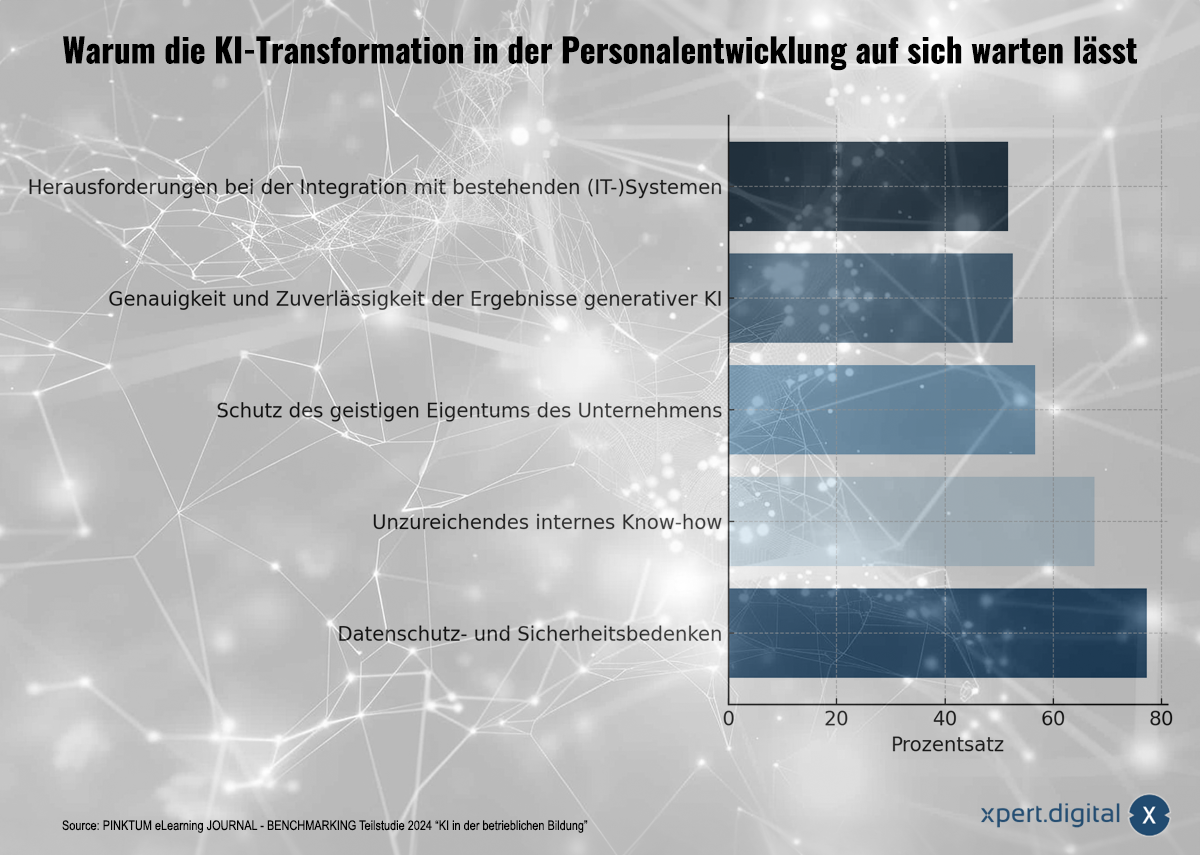
One reason for the hesitant use of AI: 68% of HR managers complain about a lack of AI know-how in companies – Image: Xpert.Digital
🤖📉 Hesitant use of artificial intelligence in personnel development: An opportunity for the future
📊 Current figures and facts
A recent survey by PINKTUM and the eLearning Journal paints a revealing picture: Although two-thirds of companies in the DACH region already use artificial intelligence (AI) in their daily work, a confident and competent approach to this key technology is still far from established. This discrepancy between usage and competence reveals considerable untapped potential in personnel development.
A survey of approximately 400 HR managers revealed that corporate HR development lags behind its potential in terms of future-proofing with AI. AI is only being used hesitantly in HR development, and training in its use is scarce. This could lead to competitive disadvantages in the long term, as AI skills are increasingly becoming a crucial factor for business success.
Alois Krtil, CTO of PINKTUM, emphasizes: “Skills in dealing with AI are a key indicator of the future viability of the economy. We observe that uncertainty within organizations regarding the use of artificial intelligence is hindering profitable opportunities for employee development.” His statement underscores the need to dismantle existing barriers and empower employees to use AI effectively.
A look at the survey results illustrates the current situation in personnel development:
- Only 32% of companies use AI tools in personnel development.
- 34% plan to continue to refrain from using AI in personnel development.
- Approximately 25% of companies intend to invest in the AI skills of their employees.
- Only 40% of respondents receive training to improve their own AI skills.
- Almost half of those surveyed feel insecure when dealing with AI.
These figures show that despite the recognized potential of AI, significant obstacles remain. The reasons for the hesitant use of AI in personnel development are manifold:
1. Data protection and security concerns (77%)
Many companies fear that the use of AI could lead to security gaps or that sensitive data is not adequately protected.
2. Lack of know-how (68%)
There is a lack of skilled workers who possess the necessary knowledge to effectively implement and utilize AI technologies.
3. Protection of intellectual property (57%)
Companies are concerned that AI tools could compromise their intellectual property.
4. Reliability of AI results (52%)
Skepticism regarding the accuracy and reliability of AI-generated results hinders acceptance.
5. Integration into existing IT systems (52%)
The technical challenges of implementing AI into existing infrastructures represent a further obstacle.
👍🌟 Positive attitudes and future prospects
Surprisingly, there is less fear of job loss due to AI. The majority of respondents (69%) see artificial intelligence as a way to make their personal work easier. This overwhelming interest in AI is encouraging and should be seen as a call to action for HR development. On average, **90%** of those surveyed believe that AI skills will become important to very important in every department within the next three years.
These findings suggest that companies should proactively take measures to train their employees in the use of AI and integrate the technology into their personnel development strategies. Only in this way can they ensure they are prepared for future challenges.
👥🚀 The role of personnel development in the AI era
Employee development plays a crucial role in preparing the workforce for the demands of digital transformation. In the AI era, this means equipping employees with the necessary skills and understanding to effectively use and integrate AI tools. This includes not only technical expertise but also the development of soft skills such as critical thinking and problem-solving, which are particularly valuable in conjunction with AI.
📈📚 Strategies for improving AI skills
To strengthen the AI skills of their employees, companies can pursue various approaches:
Targeted training programs
Development of training modules tailored to the specific needs and knowledge levels of the employees.
Use of e-learning platforms
Use of digital learning resources that offer flexibility and enable learning independent of location and time.
Creating practical application possibilities
Providing projects and tasks where employees can experience and apply AI technologies hands-on.
Promote a learning culture
Establishing an environment that promotes continuous learning and knowledge sharing.
🌟✨ Opportunities through AI in personnel development
The use of AI offers diverse opportunities in personnel development:
Personalization of learning
AI can create individual learning paths based on each employee's skills and preferences, thereby increasing the effectiveness of training measures.
Increased efficiency
Automation of routine tasks such as managing training materials or organizing training sessions.
Data-driven decisions
AI-powered analysis of learning progress and needs enables more targeted planning of development measures.
Talent management
Identification of potential employees and targeted promotion of talent through AI-supported analyses.
🛡️🗝️ Overcoming barriers
To overcome these obstacles, companies should consider the following steps:
1. Prioritize data protection and security
Implementing robust security measures and compliance with data protection laws such as the GDPR to strengthen trust in AI systems.
2. Investment in further education
Building internal expertise through training and hiring specialists with AI expertise.
3. Promote transparency
Open communication about the use of AI and how it works, in order to reduce fears and reservations.
4. Improve technological infrastructure
Ensure that the company's IT systems are suitable for AI integration and function smoothly.
🏆📈 Best practices for successful AI implementation
Successful companies demonstrate that the effective use of AI in personnel development is possible:
Iterative approach
Start with pilot projects to gather experience and adapt the approach if necessary.
Involvement of employees
Active participation of the workforce in the introduction of AI technologies to increase acceptance and engagement.
Collaboration with experts
Collaboration with external specialists or start-ups that have specific AI know-how.
🔮🚀 Positioning for the future
Digital transformation is progressing relentlessly, and AI is a key driver of this development. Companies that invest now in expanding their employees' skills and integrating AI into their personnel development are positioning themselves for long-term success.
It is important to recognize that humans are at the heart of this transformation. AI cannot and should not replace the human factor, but rather complement and strengthen it. Combining human creativity and empathy with the capabilities of AI creates new opportunities and potential.
✍️🧠 Breaking down barriers
Artificial intelligence offers enormous opportunities for employee development and overall business success. Despite existing concerns and barriers, the majority of companies and employees show a willingness and interest in using AI. It is now up to companies to capitalize on this positive attitude, proactively dismantle barriers, and invest in the future of their workforce.
As Alois Krtil aptly put it: "Skills in dealing with AI are a measure of the future viability of the economy." By empowering their employees to use AI effectively, companies create the foundation for innovation, competitiveness and sustainable success in a rapidly changing business world.
📣 Similar topics
- 🤖 Survey reveals: AI potential remains untapped
- 📈 Disparity between AI usage and expertise in companies
- 🚀 Opportunities through AI: Shaping the future of personnel development
- 🔐 Data privacy concerns: A hurdle for AI integration
- 🌱 Soft Skills and AI: The New Learning Culture
- 📚 E-learning as a key to improving AI skills
- 👥 Collaboration with experts: Success strategy for AI implementation
- 🏆 Best practices for the effective use of AI
- 🔄 Iterative approach: Pilot projects promote AI experience
- 📊 Data-driven decisions: Improvement through AI analytics
#️⃣ Hashtags: #ArtificialIntelligence #PersonnelDevelopment #DataProtection #DigitalTransformation #LearningCulture
We are there for you - advice - planning - implementation - project management
☑️ Industry expert, here with his own Xpert.Digital industry hub with over 2,500 specialist articles
I would be happy to serve as your personal advisor.
You can contact me by filling out the contact form below or simply call me on +49 89 89 674 804 (Munich) .
I'm looking forward to our joint project.
Xpert.Digital - Konrad Wolfenstein
Xpert.Digital is a hub for industry with a focus on digitalization, mechanical engineering, logistics/intralogistics and photovoltaics.
With our 360° business development solution, we support well-known companies from new business to after sales.
Market intelligence, smarketing, marketing automation, content development, PR, mail campaigns, personalized social media and lead nurturing are part of our digital tools.
You can find out more at: www.xpert.digital - www.xpert.solar - www.xpert.plus

